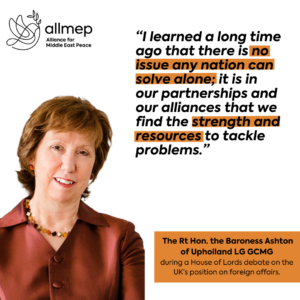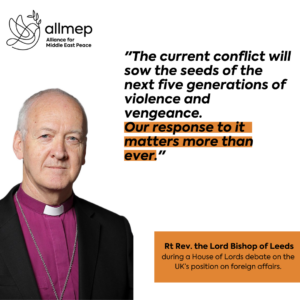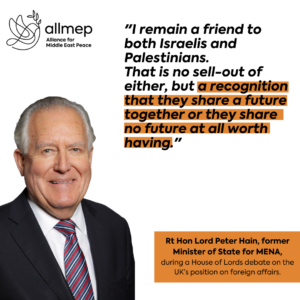Call for Long-Term Peacebuilding and Multilateralism in UK Foreign Policy Debate
In a recent House of Lords debate on the UK’s foreign policy, various Members highlighted the critical need for long-term peacebuilding, particularly in protracted conflict situations such as Israel and Palestine. The discussion showed widespread support for the UK and its international partners to prioritize and invest in the work of civil society peacebuilders.
The Archbishop of Canterbury– who attended a peace vigil featuring ALLMEP members the Parents Circle last December– set the tone by asserting that the UK’s leadership in peacebuilding is “something we have the capacity to do – but is hard won – and brings long-term prosperity and opportunity.” He argued that this principle must inform the UK’s aid policy, tackling the root causes of conflicts rather than only offering temporary relief. “If we are to talk about the use of aid, (…) we must look at where that aid is best used. Putting it properly to the service of peace has a far higher return than any other possible use of it. It saves money on fighting wars and on diplomatic intervention at a time when diplomatic intervention is virtually vain.”
Baroness Ashton of Upholland further underscored the importance of adopting a holistic and long-term approach, urging the government to “think in decades, not years” to build real peace and “tackle underlying causes, not just manifestations, as they affect us, to understand the nature of long-term needs and commit to resolving them”. Acknowledging the scale and resources needed for this endeavor, she underscored the need for true multilateralism, noting that she “learned a long time ago that there is no issue any nation can solve alone; it is in our partnerships and our alliances that we find the strength and resources to tackle problems”. Building on this, Lord Mitchell highlighted that “there are now other powers that can guarantee peace: the US, of course, and Europe too, but also Saudi Arabia, the Gulf states, Egypt and Jordan. They all have skin in the game”, making the case for the power of multilateralism in fostering peace in the region.

Concrete steps were proposed by the Archbishop of Canterbury, urging the government to “enhance the work of the peacemakers in the Foreign Office” and “encourage working with the third sector and local groups”, a call echoed later in the debate by Baroness Goudie, who then also advocated for harnessing “the positive soft power of our culture, values and ideas to forge enduring connections and facilitate dialogue across borders”.
Parliamentarians in the UK often look to successful peacebuilding endeavors in Northern Ireland, as an example, where the International Fund for Ireland– the inspiration for a similar model in the Middle East– played such a pivotal role in scaling the work of peacebuilders. Baroness Northover, Lord Hain, and Lord Mitchell urged the government to draw from its own history. Baroness Northover highlighted Northern Ireland’s transformation, reminding colleagues that “such a resolution seemed impossible in earlier years in relation to Northern Ireland, and yet it was”. She called on Foreign Secretary David Cameron to invest in serious, long-term peacebuilding for Israelis and Palestinians and not “do and say the same as we always have before”.
The Lord Bishop of Leeds, echoing this sentiment, emphasized that breaking this cycle of violence was not merely an ethical obligation but a strategic necessity which demands learning from the failures of conflict management and urgently moving towards conflict resolution. He warned that failure to adopt a new approach and invest in peace would result in “the current conflict sowing the seeds of the next five generations of violence and vengeance” and thus “our response to it matters more than ever”.

Peacebuilding is thus an investment in a collective future that transcends differences and benefits all parties. Lord Hain insisted that he “remains a friend to both Israelis and Palestinians” and that “this is not a sell-out of either side but a recognition that they share a future together or no future at all worth having“.

The session concluded with Foreign Secretary David Cameron echoing the Lords’ call for peace and pledging to “think what more we can do to surge peacemaking and peacekeeping”.







